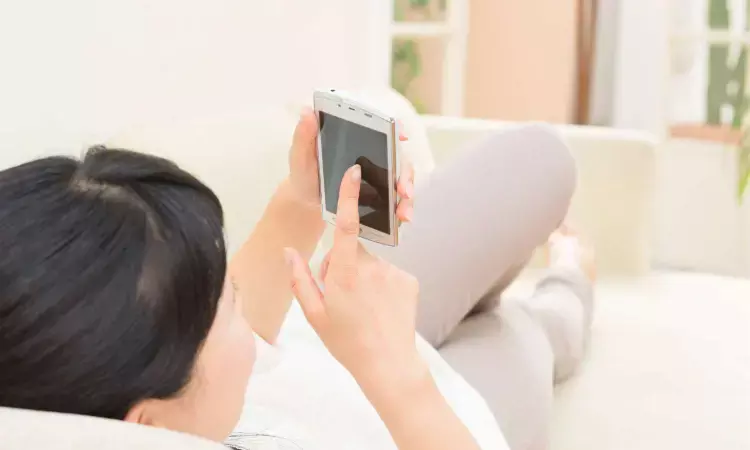- Home
- Medical news & Guidelines
- Anesthesiology
- Cardiology and CTVS
- Critical Care
- Dentistry
- Dermatology
- Diabetes and Endocrinology
- ENT
- Gastroenterology
- Medicine
- Nephrology
- Neurology
- Obstretics-Gynaecology
- Oncology
- Ophthalmology
- Orthopaedics
- Pediatrics-Neonatology
- Psychiatry
- Pulmonology
- Radiology
- Surgery
- Urology
- Laboratory Medicine
- Diet
- Nursing
- Paramedical
- Physiotherapy
- Health news
- Fact Check
- Bone Health Fact Check
- Brain Health Fact Check
- Cancer Related Fact Check
- Child Care Fact Check
- Dental and oral health fact check
- Diabetes and metabolic health fact check
- Diet and Nutrition Fact Check
- Eye and ENT Care Fact Check
- Fitness fact check
- Gut health fact check
- Heart health fact check
- Kidney health fact check
- Medical education fact check
- Men's health fact check
- Respiratory fact check
- Skin and hair care fact check
- Vaccine and Immunization fact check
- Women's health fact check
- AYUSH
- State News
- Andaman and Nicobar Islands
- Andhra Pradesh
- Arunachal Pradesh
- Assam
- Bihar
- Chandigarh
- Chattisgarh
- Dadra and Nagar Haveli
- Daman and Diu
- Delhi
- Goa
- Gujarat
- Haryana
- Himachal Pradesh
- Jammu & Kashmir
- Jharkhand
- Karnataka
- Kerala
- Ladakh
- Lakshadweep
- Madhya Pradesh
- Maharashtra
- Manipur
- Meghalaya
- Mizoram
- Nagaland
- Odisha
- Puducherry
- Punjab
- Rajasthan
- Sikkim
- Tamil Nadu
- Telangana
- Tripura
- Uttar Pradesh
- Uttrakhand
- West Bengal
- Medical Education
- Industry
Timing of Nighttime Phone Use linked to Suicidal Thoughts in new JAMA study

A new study published in JAMA Network Open by Katz et al. has explored how nighttime smartphone use relates to next-day suicidal thoughts, revealing that the timing and nature of use matter more than total duration.
The research, which combined ecological surveys and passive smartphone data from individuals with a recent history of suicidal ideation, found that nighttime phone use was not inherently harmful. Instead, its impact varied based on when and how individuals engaged with their devices. Late-night use-especially during hours close to sleep onset-was linked to heightened vulnerability and a higher likelihood of next-day suicidal thoughts, while middle-of-the-night engagement appeared to offer protective effects for some individuals.
The study’s findings highlight that digital behaviour is complex and cannot be reduced to simple screen-time metrics. Participants who used their phones in adaptive ways-such as communicating with supportive contacts or accessing coping resources-experienced reduced distress and lower suicidal ideation the following day. Conversely, those who engaged in passive scrolling or late-night, isolated phone use tended to report higher emotional distress. Researchers noted that these patterns point to distinct mechanisms, where context, purpose, and emotional state during use determine whether technology use at night becomes harmful or helpful.
Clinically, these insights underscore the importance of personalized, time-sensitive digital mental health strategies rather than blanket restrictions on phone use. Understanding when and how individuals use their devices could inform real-time interventions, such as just-in-time support prompts or crisis monitoring tools tailored to individual risk periods. The study bridges behavioural science, mental health, and digital technology, suggesting that nuanced use of smartphone data could help clinicians better predict and prevent suicidal crises.
Reference:
Katz, A. C., Kaurin, A., Panza, K. E., Kaplan, K. J., Kleiman, E. M., & Nock, M. K. (2025). Associations between nighttime smartphone use timing and next-day suicidal thoughts among individuals with recent suicidal ideation. JAMA Network Open, 8(11), e2841241. https://doi.org/10.1001/jamanetworkopen.2025.41241
Dr. Shravani Dali has completed her BDS from Pravara institute of medical sciences, loni. Following which she extensively worked in the healthcare sector for 2+ years. She has been actively involved in writing blogs in field of health and wellness. Currently she is pursuing her Masters of public health-health administration from Tata institute of social sciences. She can be contacted at editorial@medicaldialogues.in.
Dr Kamal Kant Kohli-MBBS, DTCD- a chest specialist with more than 30 years of practice and a flair for writing clinical articles, Dr Kamal Kant Kohli joined Medical Dialogues as a Chief Editor of Medical News. Besides writing articles, as an editor, he proofreads and verifies all the medical content published on Medical Dialogues including those coming from journals, studies,medical conferences,guidelines etc. Email: drkohli@medicaldialogues.in. Contact no. 011-43720751


